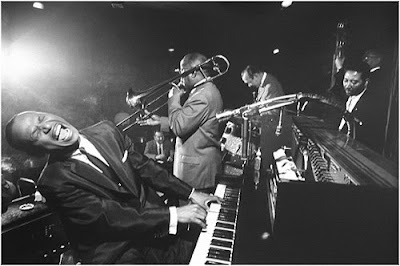Earl “Fatha” Hines, a giant of American popular music, and a man instrumental in the careers of Louis Armstrong, Art Tatum, Billy Eckstine, Sarah Vaughn, Nat King Cole, and more, will continue to promote the art of jazz for generations to come thanks to a magnificent endowment to the University of California-Berkeley. The bulk of Mr. Hines’ estate, including personal papers, musical compositions and charts, memorabilia, and a bequest of nearly $300,000, has been given to the Jean Gray Hargrove Music Library as the cornerstone of a new Archive of African American Music.
Hines always claimed to have been born in 1905, but most jazz historians believe the correct date to be 1903. He grew up in Pittsburgh in a musical family. His father played coronet in a brass band, and his stepmother was a church organist. He began playing coronet at age eight, but after blowing gave him headaches, he switched to piano. He intended to play classical piano until he heard a jazz band at age 15. Falling in love with the new music, he quit school at 16 to play full time in Pittsburgh clubs.
On December 28, 1928, his birthday, Hines debuted as the leader of his own orchestra at the Grand Terrace Ballroom. “The Grand Terrace was The Cotton Club of Chicago,” Hines said, “and we were a show band as much as a dance band and a jazz band.” Hines and his orchestra played seven days a week, three shows a night, for an audience filled with celebrities, high rollers, and gangsters. (The Grand Terrace Ballroom was co-owned by Al Capone.) The Chicago shows became so popular they were broadcast on radio nationwide, a first for an orchestra of African American musicians.
 Earl Hines, James H. “Jimmy” Archey, Francis Joseph “Muggsy” Spanier, Earl Watkins, 1958. (Photo by Dennis Stock.)
Earl Hines, James H. “Jimmy” Archey, Francis Joseph “Muggsy” Spanier, Earl Watkins, 1958. (Photo by Dennis Stock.)
From the time he was 17 until a week before his death at age 77, Earl “Fatha” Hines never stopped making records. In 1974 alone, when he was at least 70, he cut an astounding 16 albums. He became legendary for his ability to enter the studio and record an entire, finished solo LP in 90 minutes. And that 90 minute session included “discussion time” with the engineer over coffee and a double brandy. He never did a retake unless he was inspired to try a tune “some other way,” and transform it completely.
One of Hines’ Hundreds of LP Recordings.
Hines was invited to be a Regents’ Lecturer in music at the University of California,Berkeley in 1979. This reignited his interest in education, and he stipulated that part of his estate be dedicated to providing free music instruction to talented low income students. The monetary portion of his bequest will benefit students in the University’s Young Musicians Program. His papers, musical compositions and memorabilia will benefit scholars of African American culture in general, and jazz in particular.
Earl Hines In Milan, 1967. (Photo by Roberto Polillo.)
This positive and productive legacy is perfectly suited to the character of the great musician. He earned the nickname “Fatha” due to a habit of giving “fatherly” advice to those he felt over-indulged in alcohol. And one of the proudest moments of Earl Hines’ extaordinary life came at a gala in his honor, when the Managing Editor of The San Francisco Chronicle, Scott Newhall, presented him with a Steinway grand piano. A plaque on the custom made instrument saluted not just the musician but the man: “Presented by jazz lovers from all over the world. This piano is the only one of its kind in the world and expresses the great genius of a man who has never played a melancholy note in his lifetime on a planet that has often succumbed to despair.”
Of Related Interest: The Beat Of The Bullet, The Rhythm Of The Book.






